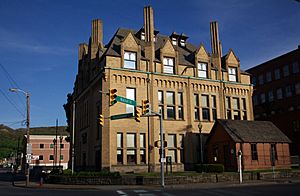Johnstown Flood Museum facts for kids
 |
|
| Lua error in Module:Location_map at line 420: attempt to index field 'wikibase' (a nil value). | |
| Established | 1973 |
|---|---|
| Location | 304 Washington St., Johnstown, Pennsylvania |
| Type | Artifacts and Local History |
|
Cambria Public Library Building
|
|
| Area | less than one acre |
| Built | 1890 |
| Architectural style | French Gothic revival |
| NRHP reference No. | 72001100 |
| Added to NRHP | June 19, 1972 |
The Johnstown Flood Museum is a special place in Johnstown, Pennsylvania. It teaches visitors all about the terrible Johnstown Flood of 1889. This museum is located inside an old building that used to be the Cambria Public Library. This library building is also a part of the historic downtown area of Johnstown.
Contents
What You Can See at the Museum
The Johnstown Flood Museum helps you understand what happened during the flood. It uses different exhibits and videos to tell the story. You can watch a documentary called The Johnstown Flood in the Robert S. Waters Theater.
Exhibits and Artifacts
One cool exhibit is a large map that uses lights and sounds. It shows how the flood moved through the area. Around this map, you can see real items that were found after the flood. These are called artifacts. The museum also features a rebuilt "Oklahoma house." These were simple temporary homes given to people who lost their houses in the flood.
History of the Museum Building
The building where the museum is now used to be the Cambria Public Library. It is a historic Carnegie library. A famous rich person named Andrew Carnegie paid for it to be built. He gave money for many libraries across the country.
Building Design and Construction
The library building was constructed between 1890 and 1891. It is a three-story building made of brick. It has a tile roof with special windows called dormers. The building's style is called French Gothic revival. Andrew Carnegie paid for the building and its upkeep until 1930.
From Library to Museum
The building was damaged during another flood in Johnstown in 1936. It stopped being a library in 1971. In 1972, it was added to the National Register of Historic Places. This means it is an important historical site. The Johnstown Flood Museum opened in this building in 1973.
Recent Closure
In January 2025, the museum building had some damage. Cold weather caused a water pipe to leak on the third floor. Because of this, the museum had to close for a while.
 | Madam C. J. Walker |
 | Janet Emerson Bashen |
 | Annie Turnbo Malone |
 | Maggie L. Walker |

